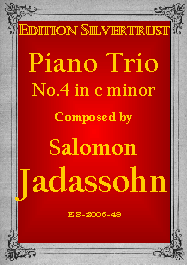Presents
Salomon Jadassohn
Piano Trio No.4 in c minor, Op.85
 Salomon
Jadassohn (1831-1902) was born to a Jewish family living in Breslau, the capital
of the Prussian province of Silesia. This was a generation after the
emancipation of the Jews in Central European German-speaking lands and during a
time of relative tolerance. First educated locally, Jadassohn enrolled at the
Leipzig Conservatory in 1848, just a few years after it had been founded by
Mendelssohn. There he studied composition with Moritz Hauptmann, Ernst Richter
and Julius Rietz as well as piano with Ignaz Moscheles. At the same time, he
studied privately with Franz Liszt in Weimar.
Salomon
Jadassohn (1831-1902) was born to a Jewish family living in Breslau, the capital
of the Prussian province of Silesia. This was a generation after the
emancipation of the Jews in Central European German-speaking lands and during a
time of relative tolerance. First educated locally, Jadassohn enrolled at the
Leipzig Conservatory in 1848, just a few years after it had been founded by
Mendelssohn. There he studied composition with Moritz Hauptmann, Ernst Richter
and Julius Rietz as well as piano with Ignaz Moscheles. At the same time, he
studied privately with Franz Liszt in Weimar.
Being Jewish, Jadassohn was unable to qualify for the many church jobs which were usually available to graduates of a conservatory such as Leipzig. Instead he worked for a Leipzig synagogue and a few local choral societies as well as teaching privately. Eventually, he was able to qualify for a position at the Leipzig Conservatory, teaching piano and composition. Over the years, he became a renown pedagogue, and Grieg, Busoni, Delius, Karg-Elert, Reznicek and Weingartner were among his many students.
Jadassohn wrote over 140 works in virtually every genre, including symphonies, concertos, lieder, opera and chamber music, the latter being among his finest compositions. Considered a master of counterpoint and harmony, he was also a gifted melodist, following in the tradition of Mendelssohn. But one also hears the influence of Wagner and Liszt, whose music deeply impressed him.
Jadassohn scholar Klaus-Peter Koch believes that Jadassohn and his music were not better known primarily for two reasons: The first being Carl Reinecke and the second being the rising tide of anti-semitism in late 19th century Wilhemine Germany. Reinecke was almost Jadassohn's exact contemporary and somewhat of a super-star. Not only was he a world famous piano virtuoso but also an important professor at the Leipzig Conservatory and later its director. If this were not enough, he served as the conductor of the renowned Leipzig Gewandhaus Orchestra. Under these circumstances, it was hard for a colleague to get the public's attention.
Koch notes, that toward the end of the 19th century, anti-semitic critics attacked Jadassohn's music, labeling it academic and dry, an epithet which has stuck with it ever since without anyone ever investigating. However, even a brief hearing of any of his chamber music reveals how ludicrous this assessment is. Listen to our sound-bites. Salomon Jadassohn was a first-rate composer, who unfortunately was never really given a chance to promote his music.
We believe his Piano Trio No.4 is a masterpiece which belongs in the concert repertoire as well as on the stands of amateur piano trio players. Dating from 1887, the opening Allegro energico begins with a powerful theme full of emotion first given to the cello. The writing is highly imaginative, veering from large scale dramatic episodes to more intimate lyrical moments. The light and playful Scherzo which comes next has the vague aura of Mendelssohn about it without in anyway being imitative. There is a wistful trio which provides fine contrast. The long, spacious and highly lyrical opening theme to the slow movement, Adagio sostenuto, begins low in violin register and though it moves forward slowly, it does so with dramatic tension. This is clearly the writing of a master composer. In the finale, the piano dramatically lays the ground work for big opening theme which is taken over by the strings. Along the way, soft charming, lyrical episodes are interspersed with powerful dramatic outbursts.
Parts: $29.95